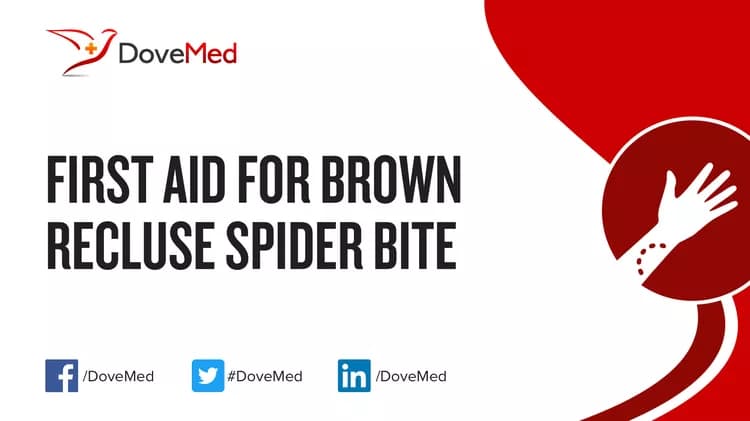What is Brown Recluse Spider Bite?
- The brown recluse spider is a poisonous spider that is native to certain regions of the United States. This spider is half an inch long in size with distinct, dark, violin-shaped marks on its head and body. Also, unlike other spiders that have 4 pairs of eyes, the brown recluse has 3 pairs, which is a distinguishing factor
- Brown Recluse Spider Bites can result in itching, fever, chills, and fatigue. Any individual bitten by the spider should seek immediate medical attention
Identification:
- Brown recluse spiders are typically small to medium-sized spiders with a round, bulbous abdomen
- They have eight long, thin legs and are usually brown in color, with a distinctive violin-shaped marking on their cephalothorax
- Females are usually larger than males and have a rounder abdomen
What are the Causes of Brown Recluse Spider Bite?
- The brown recluse spiders generally bite on provocation, which may be unintentional or inadvertent, when they are surprised suddenly or while defending their habitat
- These spiders release a small amount of poisonous venom into the skin when they bite. The venom is significantly toxic and can cause tissue necrosis
Brown recluse spiders are capable of causing serious envenomation when they bite. The venom of the spider contains a toxin that destroys tissue and can lead to necrosis (tissue death) around the bite site
What are the Signs and Symptoms of Brown Recluse Spider Bite?
The signs and symptoms of Brown Recluse Spider Bite depend can vary from one individual to another. It is often seen that the symptoms are not manifested immediately following the spider bite. In general, the signs and symptoms may include:
- Mild to moderate pain at the site of the bite that may develop into severe pain after several hours
- Fever, chills, and sweating
- Fatigue, nausea
- Muscle pain and painful joints
- Visible red to purple area around the bite
- Itching at the affected site
- Ulceration around the bite site; sometimes, the ulcerations are extensive
Children, older adults, and individuals with frail health may present severe reactions to the toxin.
How is First Aid administered for Brown Recluse Spider Bite?
First Aid tips for Brown Recluse Spider Bites:
- Call the Poison Control Center at 1-800-222-1222 (or your local poison control center) for further instructions
- Clean the bite site with soap and water
- Put a wet, cold cloth or an ice pack on the bite site (cold compress)
- Elevate the limb, if bite is on the extremities
- Limit physical activities
- Consider taking antihistamine for allergic reactions and aspirin or acetaminophen to relive pain
- Seek medical advice, before giving any kind of medications to children
- Seek medical help for all cases of Brown Recluse Spider Bites
- If safely possible, take the spider (or parts of it) to the healthcare facility for identification
Treatment may include pain management, wound care, and antibiotics to prevent infection.
Who should administer First Aid for Brown Recluse Spider Bite?
- First Aid for Brown Recluse Spider Bites should be administered by a medical professional or trained first-aider
- In absence of the above, the individual who is affected, or someone nearby can administer initial first aid, following which one should seek immediate medical help
What is the Prognosis of Brown Recluse Spider Bite?
- The prognosis is dependent on the location of bite, the severity of reaction, the overall health of the individual, and timeliness of treatment. In most cases, the prognosis of Brown Recluse Spider Bite is typically good with appropriate treatment
- If prompt medical attention is given, most patients can recover fully without any long-term effects being noted
- In case of treatment delays or a lack of treatment, in some individuals (children), the condition may result in complications that may include severe skin and tissue necrosis, seizures, and renal failure. Even though deaths are very rare, a few have been reported
How can Brown Recluse Spider Bite be Prevented?
Brown Recluse Spider Bites may be prevented by:
- Avoiding being outdoors at night in brown recluse spider-infested areas
- Use pest control in areas where the spiders are found in large numbers
- Use insect repellents, such as DEET, and spider repellents, when necessary
- Wearing gloves when working in the garden or bush
- Wearing clothes that cover the entire body while outdoors in the evenings or at nights
- Avoid wearing clothes or shoes that have been lying around undisturbed for a while, without first inspecting them thoroughly
- Do not reach into dark nooks/corners/recesses of the house with your bare hands/foot
- Do not let clutter accumulate in various parts of the house (such as in the cellar, garage, closets, etc.)
- Install screens on doors and windows to prevent spiders from entering the house
What are certain Crucial Steps to be followed?
- If you live in areas where brown recluse spiders are prevalent, it is essential to take necessary precautions to prevent being bitten
- Learn how to identify brown recluse spiders and their habitats to avoid them
- Call 911 (or your local emergency help number), if the condition is serious
- Administer antihistamines, if the individual has an allergic reaction
- Do not attempt to catch or handle the spider, as this can increase the risk of being bitten
Related Articles
Test Your Knowledge
Asked by users
Related Centers
Related Specialties
Related Physicians
Related Procedures
Related Resources
Join DoveHubs
and connect with fellow professionals



0 Comments
Please log in to post a comment.